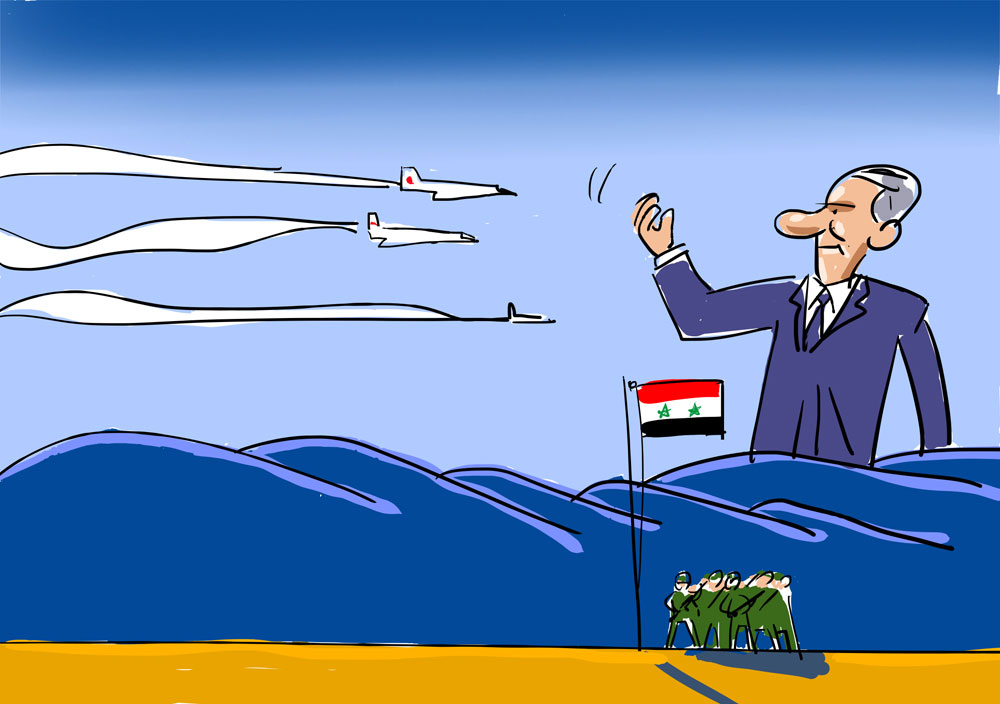
Drawing by Iorsh
The pullout of the main body of Russian forces from Syria raises many questions. Why, for example, did this happen before the capture of the ISIS capital of Raqqa? What will happen now with Syrian leader Bashar al-Assad, whose position has been clearly weakened? Finally, is it correct to draw a comparison with the end of the Soviet operation in Afghanistan, which led to very unpleasant consequences?
No matter how high the degree of public rhetoric in the Russia-West-Damascus triangle, one needs to understand that there would not be a withdrawal without guarantees for Assad and without fixing the general framework of Syria's political system for a transitional period. Hence, both the U.S. and European negotiators are internally prepared for the fact that Assad will not go anywhere in the near future.
In general, all this is more like the withdrawal of U.S. troops from Afghanistan than of the Soviet troops from that country. The bases have remained, as well as the infrastructure and a sufficient contingent, while the government troops have been partially re-equipped, and sometimes even trained.
Meanwhile, the situation on the regular front lines is stable, with the odds in favor of Damascus, and the peace talks are being held on a parity basis. No one has been "cast adrift," rather the contrary.
Let's start with the fact that the ISIS and opposition infrastructure has been destroyed to such an extent that they are only theoretically able to carry out any effective action. This is what they tried to do a week ago, capturing several heights on the road to Aleppo, but were knocked out a day later.
This event was so widely publicized that it gave an impression of a global victory. In reality, such an attack, with the forces amounting to less than one battalion, is the only thing that the jihadists are capable of now.
On the other hand, Assad's diplomatic position has been clearly weakened. If the military targets that were set for the Russian group have been generally accomplished, the political results are so far difficult to evaluate.
In fact, Damascus cannot be completely satisfied with this outcome of events. The Syrian army has been stopped at its peak capacity, which always hurts. Assad has fallen out of touch with the multi-vector intrigues typical for the East.
He has been betrayed by too many people, including those closest to him, so it will take further diplomatic and behind-the-scenes efforts to train all the players to make compromises. At the same time, the very fact of the start of negotiations as well as the preservation of the continuity and stability of power in Syria is already a great success.
Now the U.S.-led coalition is left alone with ISIS both in Iraq and in Syria. Its combat strength is low, but no one is preventing it from starting to build it up right now. In this case, Washington will be crowned with the laurels of victory.
It is reasonable to assume that the weakened ISIS has been thrown at the mercy of the U.S.-led coalition in exchange for maintaining the stability of Syria. Not in terms of the stability of the Assad family, although this is important, but in terms of preserving a mutually acceptable configuration of power in the Middle East.
Therefore, the destruction of ISIS and the like is now only a matter of time and losses. If the U.S.-led coalition is ready to take on this responsibility, no one will hinder them, but there is no one left to pull their chestnuts out of the fire for them.
Now, even the capture of Palmyra is not crucially important, except only ideologically, since the "men in black" have already destroyed everything they could there, while the main attention of Damascus is diverted for talks with those who are ready for them.
To suffer losses for a piece of bare desert, even with the prospect of advancing on Raqqa, is for the time being a waste of resources.
In addition, the capture of Raqqa is a questionable operation in principle. During the time the city has been considered to be the unofficial capital of ISIS, there has remained part of the population that finds it comfortable to live under this regime.
This may seem outrageous for a European, but ISIS indeed enjoys some support in provinces. There are quite a lot of people who like to trade slaves, not to work, watch public executions, rape for religious purposes, and the like. What to do with them in liberated Raqqa? Will they fall under the amnesty, or should no mercy be shown? This is a much more complex issue than even the timing and mechanism of elections. So maybe it is right that an advance deep into the desert is now out of the question.
First published in Russian in Vzglyad.
The opinion of the writer may not necessarily reflect the position of RBTH or its staff.
All rights reserved by Rossiyskaya Gazeta.
Subscribe
to our newsletter!
Get the week's best stories straight to your inbox